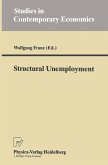This book challenges this free market orthodoxy. The chapters include both cross-country analyses and individual country case studies by leading labor economists from seven North American and European countries. The unifying theme across the essays is that the orthodox case for blaming persistent high unemployment on labor market institutions is simply not supported by the available evidence. This question has enormous policy significance. Since the individual,
economic and social costs of unemployment are so high, we need to fight unemployment as effectively as possible. But it is often forgotten - often by well-paid tenured economists - that eliminating social protections through rolling back the welfare state has high individual, economic and social costs as
well. The essays in this volume suggest that the conventional focus on labor market deregulation has been misplaced. More plausible sources of joblessness include tight European macro economic policy,political instability, poor coordination between "social partners" (employers, unions, and the state), the challenge of responding to rapid demographic changes (the "baby boom"), and the need for rapid shifts in employment from agriculture, mining and heavy industry to service jobs in some less
developed regions.
Hinweis: Dieser Artikel kann nur an eine deutsche Lieferadresse ausgeliefert werden.
economic and social costs of unemployment are so high, we need to fight unemployment as effectively as possible. But it is often forgotten - often by well-paid tenured economists - that eliminating social protections through rolling back the welfare state has high individual, economic and social costs as
well. The essays in this volume suggest that the conventional focus on labor market deregulation has been misplaced. More plausible sources of joblessness include tight European macro economic policy,political instability, poor coordination between "social partners" (employers, unions, and the state), the challenge of responding to rapid demographic changes (the "baby boom"), and the need for rapid shifts in employment from agriculture, mining and heavy industry to service jobs in some less
developed regions.
Hinweis: Dieser Artikel kann nur an eine deutsche Lieferadresse ausgeliefert werden.
The essays in this book are an in-depth challenge to the received wisdom that labor market rigidity is to blame for poor employment performance, in Europe and elsewhere. Though not all readers may agree with the nuances, these essays contain a wealth of interesting data analysis and discussion. This volume serves as a perfect antidote to the view that comprehensive labor market deregulation is the only way forward. Jonas Agell, Professor of Economics, Stockholm University








